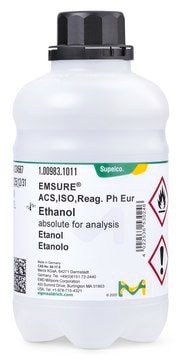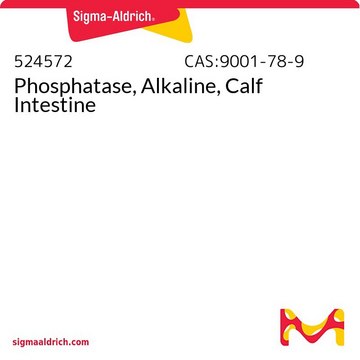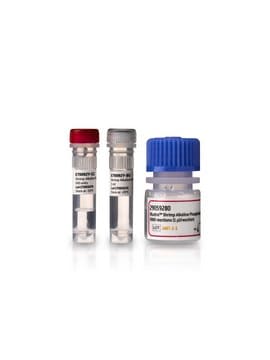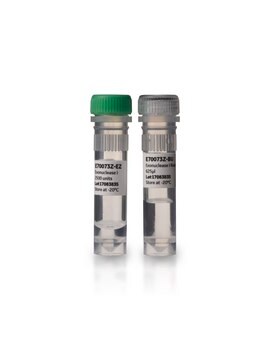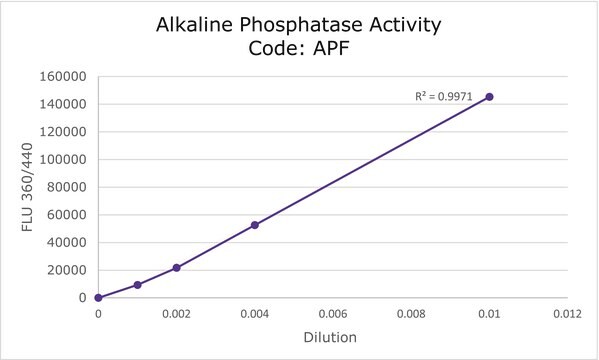RAP-RO
Roche
rAPid Alkaline Phosphatase
1 units/μg protein, optimum reaction temp. 37 °C
Sinónimos:
alkaline phosphatase, cloning of dna fragments
About This Item
Productos recomendados
biological source
bovine intestine
Quality Level
recombinant
expressed in Pichia pastoris
form
liquid
specific activity
1 units/μg protein
mol wt
monomer 56 kDa by SDS-PAGE
packaging
pkg of 1,000 U (04898133001 [1 U/μl])
pkg of 5,000 U (04898141001 [1 U/μl])
manufacturer/tradename
Roche
concentration
<0.1 % (w/w)
parameter
37 °C optimum reaction temp.
technique(s)
molecular cloning: suitable
color
colorless
pH
7.6-8.5 (68 °F)
solubility
water: miscible
suitability
suitable for molecular biology
NCBI accession no.
UniProt accession no.
application(s)
life science and biopharma
foreign activity
Nicking activity, none detected (up to 20 µl enzyme using pBR322-DNA/ 16h / 37°C)
unspecific endonuclease, none detected (up to 20 µl enzyme using Lambda-DNA 16 h/37 °C)
storage temp.
−20°C
Gene Information
bovine ... ALPI(280993)
Categorías relacionadas
General description
Specificity
Heat inactivation: rAPid Alkaline Phosphatase is inactivated by incubation at 75 °C for two minutes.
Application
- Use rAPid Alkaline Phosphatase in numerous applications, including: Removal of 5′-phosphoryl groups from nucleic acids
- Preparation of templates for 5′-end labeling
- Clean-up of PCR products by removal of dNTPs
- Dephosphorylation of proteins
Note: rAPid Alkaline Phosphatase is also included in the Rapid DNA Dephos & Ligation Kit, which enables fast and efficient dephosphorylation and ligation of sticky- or blunt-end DNA fragments. With this convenient kit, dephosphorylation of blunt and sticky 5′-overhanging ends is performed in ten minutes at +37 °C and ligation is completed in just five minutes at +15–25 °C.
Features and Benefits
- Eliminate contamination risk: Recombinant expression, and reliable and sensitive quality control tests ensure high purity.
- Replace your current phosphatases with an economical solution: rAPid Alkaline Phosphatase performs equally as well as Shrimp Alkaline Phosphatase or Bovine Alkaline Phosphatase.
- Eliminate the risk of animal-derived diseases: Expression in Pichia pastoris ensures consistency and safety.
- Benefit from rapid heat inactivation: rAPid Alkaline Phosphatase is inactivated after only 2 minutes at +75°C.
- Obtain consistent performance: rAPid Alkaline Phosphatase has excellent stability during storage compared to other alkaline phosphatases.
Packaging
Quality
Unit Definition
Volume Activity: 1 U/μl
Other Notes
Solo componentes del kit
- rAPid Alkaline Phosphatase Buffer 10x concentrated
- rAPid Alkaline Phosphatase 1 U/μl
Storage Class
12 - Non Combustible Liquids
wgk_germany
WGK 1
flash_point_f
does not flash
flash_point_c
does not flash
Elija entre una de las versiones más recientes:
¿Ya tiene este producto?
Encuentre la documentación para los productos que ha comprado recientemente en la Biblioteca de documentos.
Los clientes también vieron
Nuestro equipo de científicos tiene experiencia en todas las áreas de investigación: Ciencias de la vida, Ciencia de los materiales, Síntesis química, Cromatografía, Analítica y muchas otras.
Póngase en contacto con el Servicio técnico


